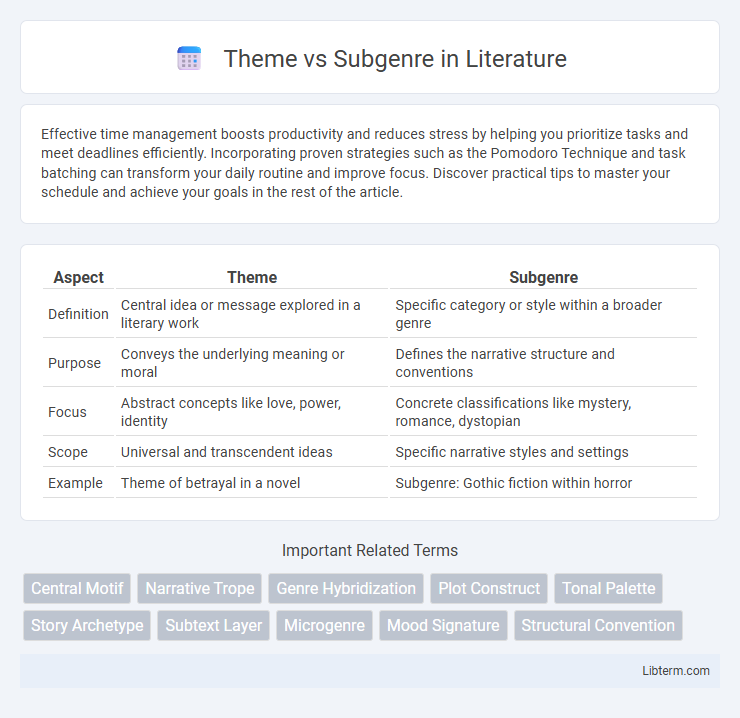Effective time management boosts productivity and reduces stress by helping you prioritize tasks and meet deadlines efficiently. Incorporating proven strategies such as the Pomodoro Technique and task batching can transform your daily routine and improve focus. Discover practical tips to master your schedule and achieve your goals in the rest of the article.
Table of Comparison
| Aspect | Theme | Subgenre |
|---|---|---|
| Definition | Central idea or message explored in a literary work | Specific category or style within a broader genre |
| Purpose | Conveys the underlying meaning or moral | Defines the narrative structure and conventions |
| Focus | Abstract concepts like love, power, identity | Concrete classifications like mystery, romance, dystopian |
| Scope | Universal and transcendent ideas | Specific narrative styles and settings |
| Example | Theme of betrayal in a novel | Subgenre: Gothic fiction within horror |
Defining Theme and Subgenre
A theme is the central idea or underlying message conveyed throughout a literary or artistic work, such as love, war, or identity. A subgenre is a more specific category within a broader genre, characterized by distinct stylistic elements and conventions, like cyberpunk within science fiction or gothic romance in the romance genre. Understanding the difference helps creators and critics categorize works based on thematic content versus stylistic and narrative approaches.
Importance of Theme in Storytelling
Theme serves as the foundational idea or message that shapes the emotional and intellectual experience of a story, providing depth and coherence beyond plot events. Subgenre categorizes stories into specific narrative frameworks and conventions, but without a strong theme, a subgenre risks feeling superficial or formulaic. Emphasizing theme ensures storytelling resonates universally, offering insight and meaning that transcend subgenre boundaries.
Role of Subgenre in Classifying Works
Subgenre plays a crucial role in classifying works by providing more specific categories within a broad genre, enabling deeper analysis and targeted audience engagement. While the theme addresses the underlying message or main idea of a story, subgenre defines stylistic and narrative conventions, such as dystopian in science fiction or cozy in mystery. This classification helps creators, marketers, and readers understand expectations and nuances, enhancing the overall interpretation and appreciation of the work.
Key Differences Between Theme and Subgenre
Theme represents the central idea or underlying message that an author explores throughout a story, such as love, betrayal, or freedom. Subgenre categorizes a story based on specific conventions or elements within a broader genre, like cyberpunk in science fiction or gothic romance in the romance genre. The key difference lies in theme addressing the narrative's conceptual essence, while subgenre defines its stylistic and structural classification.
How Themes Shape Narrative Direction
Themes fundamentally influence the narrative direction by providing a central idea or message that guides plot development and character motivation. Narratives driven by themes such as redemption, identity, or power explore specific emotional and moral questions, shaping conflicts and resolutions to align with the overarching message. This thematic foundation distinguishes subgenres, which categorize stories by stylistic and structural elements, while themes determine the story's deeper purpose and resonance.
Subgenre: Adding Specific Flavor to Genres
Subgenres add specific flavor to broad genres by introducing unique elements, settings, or narrative styles that distinguish them from the main genre. For example, within the horror genre, psychological horror emphasizes mental and emotional fear, while slasher films focus on graphic violence and suspense. This specialization allows authors and creators to target niche audiences and explore diverse storytelling approaches within a single genre framework.
Common Examples of Themes in Literature
Common examples of themes in literature include love, betrayal, revenge, and the struggle for identity, each representing universal ideas that drive a story's message. Themes explore fundamental human experiences while subgenres categorize the style or setting, such as mystery, fantasy, or romance. Understanding the distinction helps readers analyze the underlying meaning versus the narrative framework of a literary work.
Popular Subgenres Across Different Media
Popular subgenres across different media, such as horror thriller in films, cyberpunk in literature, and fantasy RPGs in video games, offer specific narrative styles and thematic elements that enhance audience engagement. Themes like revenge, survival, or identity provide underlying messages, while subgenres focus on particular plot devices, settings, or character archetypes that define the storytelling approach. Understanding the distinction allows creators to target niche audiences and enrich content within broader thematic frameworks.
Interplay Between Theme and Subgenre in Fiction
Themes in fiction represent the underlying messages or central ideas, while subgenres categorize stories based on specific stylistic and narrative conventions. The interplay between theme and subgenre shapes reader expectations by blending broad concepts like love or betrayal with distinctive elements such as dystopian settings or cozy mysteries. This dynamic allows writers to explore universal human experiences within tailored narrative frameworks, enhancing emotional depth and genre appeal.
Choosing the Right Theme and Subgenre for Your Story
Selecting the right theme and subgenre for your story enhances narrative depth and audience engagement by aligning plot elements with readers' expectations. Themes like love, betrayal, or redemption provide universal emotional undercurrents, while subgenres such as cyberpunk, romantic thriller, or historical fantasy define specific setting and tonal conventions. Balancing these elements ensures coherence in storytelling, making your work more marketable and emotionally resonant.
Theme Infographic

 libterm.com
libterm.com